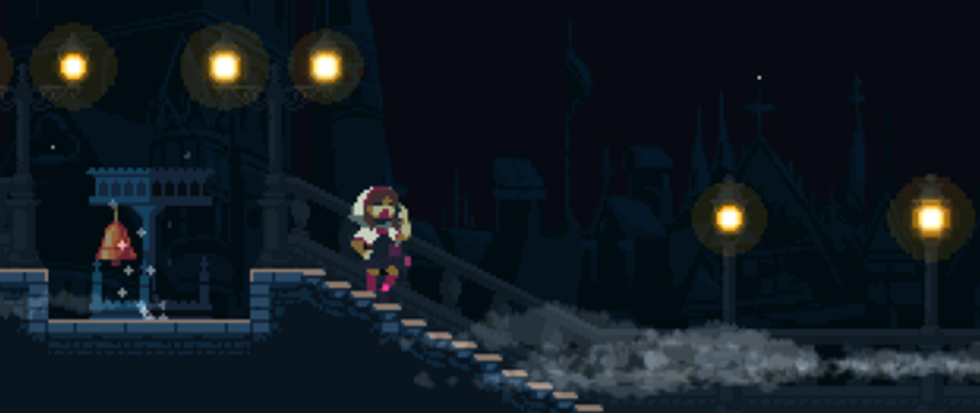
“You Just Have To Start!” An Interview with Marskye (AKA Ramsey Kharroubi)
Whether you’ve been raiding tombs or delving into dungeons with polymorphic sword-boyfriends, odds are good you’ve heard the electrical experimental beats of Marskye (AKA Ramsey Kharroubi). With his latest work on the way in the upcoming Thirsty Suitors, I had the opportunity to chat with the composer to learn what inspires his endlessly evolving efforts to craft a pitch-perfect indie soundtrack. It’s a journey that took the young composer from the mountains of Lebanon to the shores of rainy Seattle.
Typically when you think of Lebanon, you might not picture electronic beats or shredding metal ballads, but for Marskye, those genres carried him through his early years. “I got my first guitar at age fourteen,” he recalls, “and taught myself how to play and record using a computer. I had to do a lot of music forum diving back in the day because growing up there weren’t a ton of music connections where I lived and forums were the only way to find specialized knowledge.”
When time for university studies came round, Marskye would instead find himself drawn to write music with friends. Though his more traditional studies didn’t quite go as planned, “it eventually led to game industry connections.”
It was during this time in Lebanon that a friend of Marksye would start their own game company, specifically looking for a composer to set the mood for their various experimental titles. Marksye would also contribute to and collaborate on the sound design: “Communication is key. [You] have to take into account all the aspects of the design to ensure that everything sounds cohesive. For instance, the sound designer and I will meet frequently to playtest, working to integrate the music. We watch for things that sound jarring, using every tool available to us in order to make the environment feel natural, cohesive, and responsive.”

Yet instruments alone weren’t quite fast enough for Marksye’s creative vision. During what he describes as a “peculiar” time in his life, Marskeye found himself falling heavily into the electronic scene, citing The Flashbulb, Squarepusher, Lusine, and Lone as artists who captured his attention. “I think the greatest strength of electronic music is that it encompasses a wide range of styles,” he explains, “and can invoke a variety of emotions from the listener. As a musician this gives you a lot of freedom. It was also more financially feasible for me. Using soft synths on my laptop to make tracks was faster and easier than recording live instruments. I could also formulate an idea with MIDI faster than I could physically record myself playing guitar.”
Throughout this evolution, Marksye’s fondness for working in games kept growing, “Since [that first team], I’ve been lucky to work on increasingly bigger projects,” he says, “Being a composer has allowed me to keep a very flexible schedule and has kept me involved with video games in the best way.” Just as flexible is Marksye’s resume, spanning everything from major IPs like Tomb Raider’s Lara Croft Go to indie darlings like GNOG and Boyfriend Dungeon. “Every team has been a unique experience,” he says, “Generally speaking with indie devs there is a more openness to collaborate and to go for experimental ideas. I really appreciate this aspect, and find teams like this very exciting and welcoming.”
It’s in this collaborative space where not only new ideas are possible, but some of Marksy’s best work flourishes. “On past projects I’ve had game directors suggest tonal shifts, melodies, and even contribute lyrics. It’s all welcome to me, and I want as much of their imagination imbued in the music as much as possible. In fact, I would say in many cases that it’s necessary in order to bring the best sound to life.” This creative fine-tuning is part of why Marksye is so happy to be working with Outerloop on Thirsty Suitors.
“Outerloop has been amazing,” he explains with a grin, “valuing my contributions from the very beginning. Many composers sadly aren’t treated with the respect that they and their work deserves. Some composers aren’t consulted until late in the game creation process, or might not even be compensated further if a game is a success.” Fortunately, with a team and project that resonate close to home with his heritage and culture, Marksye elaborates, “The values of Outerloop align with my own – we’re sort of family. When I have an idea for music I feel like I am sharing it with people I love, whom I consider my friends. So it’s been like collaborating with your best buddies, which makes the project very fun and smooth sailing.”

One can easily see why Thirsty Suitors has been a thrilling challenge for the team. Rather than rely on any one genre, the title throws skateboarding, cooking, turn-based “battle your exes” anti-flirting, and a dash of quarter-life crisis simulator – all centering on Jala, a second generation daughter of a loving (and lovingly sassy) South Asian family. With multiple exes and gameplay styles to embody, Marksye was challenged to offer a cohesive yet immensely varied composition.
Looking back on his work for the project, he says, “It’s helped broaden my range immensely, as well as recognize marginalized groups and traditional music that need more representation. I’ve not only taken these elements, blending them to appeal both to the game community, but also to identify with niche groups of listeners. The skills I developed will stick with me in the years ahead.”
On that note, I had to ask what genre he’d love to tackle next. Without hesitation, he replies, “Definitely horror! The music I’m mostly known for composing is on the brighter end of the spectrum, but would love to channel my darker stuff someday. I already have a tendency to gravitate to heavier, darker melodies in general, so I think it would make a good fit.“
He hopes that with the growing appreciation for music, that more players recognize how integral composers are in creating their favorite experiences. Reflecting on how careful a composer has to be to create tracks that can be heard time and again in the background, “It’s crucial to have moments of tension and release – they’re the connecting chains to the bigger repetitive parts. Getting it to a stage where those highs and lows are experienced seamlessly throughout the gameplay is the sweet spot. Play testing and watching how closely the music matches the gameplay helps you zero in on whether the music is repetitive.” He then adds, “I would also say that the arrangement is essential, looping parts are repetitive on their own, but they can be arranged in endless interesting ways that are conducive to more progressions that keep the music fresh.”
Some games surmount this hurdle with more dynamic soundtracks, blending various elements together through scripting rather than traditional composition. While useful, Marksye warns, “It can be tricky. Ideally, you want to find creative solutions to ease switches and transitions to keep the music flowing relatively unnoticed by the player. So we [at Outerloop] are always trying to match the tone moment to moment as much as possible, responding to what the player is going through.”
Explaining further, he says “Too many switches can also negatively impact the experience. It’s about finding a good balance. Plus, what you’re trying to achieve dynamically depends on other factors like the feel and pacing of the particular section of gameplay, combat, conversation etc. Ultimately it’s a creative decision on what parts to revamp or cut altogether, how long parts need to be and where they need to be placed to have the best impact.” As always, fine-tuning and playtesting are key parts of Marksye’s methodology, ensuring every note is in its perfect place.
Which isn’t to say all Marksye’s playtime is spent testing. “I do play games for fun as well,” he says with a laugh. Alongside the works of Hideo Kojima, famous for their elaborate soundtracks, Marksye is fond of the Machinarium soundtrack (calling it “absolutely gorgeous!”), Final Fantasy, Journey, and the Legend of Zelda. He also maintains an eclectic range of artists on his musical playlist, everything from electronic to pop, film and game soundtracks, rap, and especially metal, harkening back to his roots.
For those who seek to follow in his footsteps, Marksye says, “Just find the easiest path to record your music. It could be with your phone, an instrument, or a computer. Whatever is available to you will work; don’t let the means be a barrier to recording. It’s important to just record all the ideas in your head that have never been heard before. You just have to start!”
Thirsty Suitors is out later this year, November 2nd, 2023, with a free demo available on Steam. You can kick back with all of Marksye’s latest work on his website and Spotify.
———
With over ten of writing years in the industry, Elijah’s your guy for all things strange, obscure, and spooky in gaming. When not writing articles here or elsewhere, he’s tinkering away at indie games and fiction of his own.





